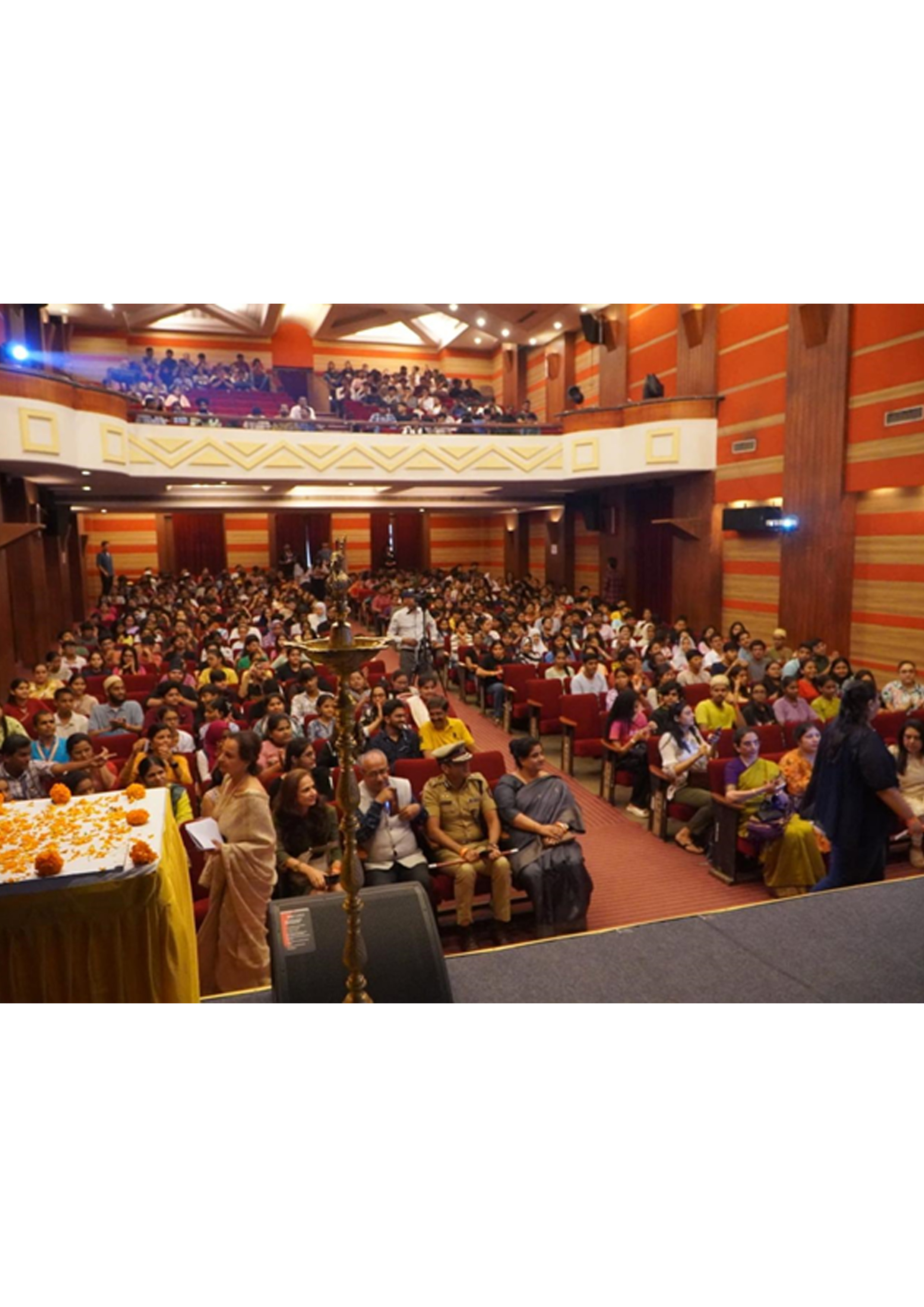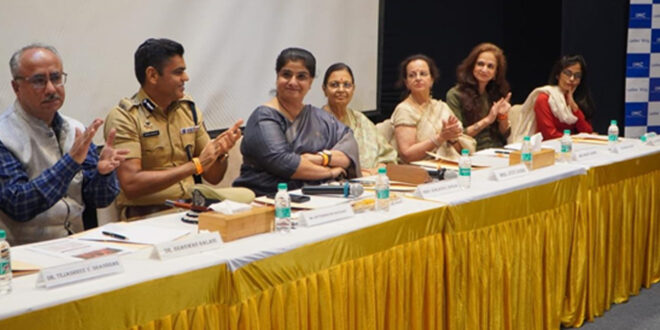
HSNC University, Mumbai in association with the ‘Amchi Mumbai Safe Mumbai’ Committee of the Ladies Wing of IMC Chamber of Commerce and Industry organised a special seminar on “Cyber Crime Alert” on 4th July 2024. The awareness program, in which students and staff (teaching and non-teaching staff) of HSNC University, Mumbai participated was organised so that they would find this information useful and they would also create awareness amongst their family and friends.
Mr. Satyanarayan Chaudhary, Joint Commissioner of Police, Law & Order graced the event as Guest of Honour and delivered the keynote address. Mrs. Jyoti Doshi, President of IMC Ladies Wing, Mrs. Bharti Gandhi – Chairperson, Aamchi Mumbai, Safe Mumbai Committee and Ms. Reena Rupani – Co-Chairperson, ‘Aamchi Mumbai, Safe Mumbai’ Committee; Principalsof constituent colleges, Deans and Directors of HSNC University, Mumbai were also present. The event started with the lighting of the lamp and felicitation of the dignitaries.
In her Opening Remarks, Dr. Hemlata Bagla, Vice Chancellor of HSNC University, emphasised the critical need for a transformative approach to addressing cyber safety, adaptable to the ever-evolving technology landscape. Citing a UNESCO report, she highlighted a significant concern: “62% of digital users are unaware of being cyber-bullied, which underscores the pressing need for regulations and guidelines that extend beyond academia.”
Dr. Bagla stressed that digital safety is a shared responsibility. She called for a concerted effort from various sectors to create a safe digital environment. “Police and government organizations, NGOs, and educational institutions and Parents must join hands to create a safe digital environment. Our collective efforts can equip our youth with the knowledge and tools to navigate the digital world safely,” Dr. Bagla added. “Together, we can build a secure and inclusive digital future, empowering our youth with the knowledge and resilience to navigate the digital world safely,” she said.
In his keynote address, Mr. Chaudhary said that “Cyber crime has increased tremendously over the past four years. If anyone is a victim of cyber crime, they should call the 1930 helpline number immediately. It is critical to report cyber crimes within golden hour. In cyber fraud, the ‘golden hour period’ is very important. You should report any losses within three hours on 1930 or on the cyber crime website. Then the chances of recovery are better. In this way alone, Mumbai Police have recovered Rs 44 crore in the first six months of 2024”.
Mr. Chaudhary highlighted that cyber hygiene or cyber security hygiene is a set of best practices which organisations and individuals need to perform regularly to maintain the health and security of users, devices, networks, and data to secure themselves from theft or misuse. By maintaining good cyber hygiene, an individual can minimise the risk of operational interruptions, data compromise and data loss, he added.
While apprising on the precautionary measures, Mr Chaudhary shared “Don’t share your OTP (one time password) with anyone. Don’t trust any links provided to you by anyone, always check if the activity is legal or illegal. Don’t answer video calls of unknown callers”.
Later, the cyber crime team comprising Suvarna Shinde,Senior Police Inspector; Poonam Jadhav, Police Sub-inspector and Rajesh Khushalani, Head Constable from the Cyber Crime Cell of Mumbai Police, shed light on cyber crime related issues and gave specific examples on each. They cautioned everyone about social media crimes, financial frauds, banking frauds, electricity frauds, dating/ matrimony frauds, loan app frauds, sextortion or web claim frauds which further leads to blackmailing through misuse of photographs. Out of this, 80% are financial frauds while 20% are social media crimes which take place due to lack of awareness of people on precautions to be taken while sharing their data and personal information on social media websites.
Participants were briefed in detail about cyber security and cyber related crimes and vigilance against them. Modus operandi for a number of different types of cyber crime and how to avoid them was explained such as KYC fraud, FedEx scam, Credit card fraud, cyber bullying, cyber fraud, blackmailing of women by uploading obscene photos of women.
“We receive 2,500 to 3,000 calls at the Maharashtra Cyber Cell every day, and around 400 cases are registered on the National Crime Record Bureau portal. Once a victim calls 1930, a complaint is registered and an email is sent to the bank where the money landed. Once the email goes, the account will be ‘lien mark’ – meaning all activities will be stopped. After that, we ask the bank to lien mark the amount of that particular transaction,” Mr. Khushalani said. For instance, let’s say a victim loses Rs 1,00,000, which lands in a different account. That bank is asked to only lien mark the Rs 1,00,000 which was transferred into the account.
Rajesh Khushalani, through his powerpoint presentation explained- how to safeguard from such cyber crime with practical demos on websites such as have I been pwned? One can also check “My Activity” after logging on Google, besides other crucial details such as avoiding using the same password, using multi-factor authentication, backing data regularly, ensuring privacy by not posting private information such as home address, private pictures, phone number or credit card numbers publicly on social media. He also listed several do’s and don’t’s to be remembered about cyber-crimes like activate two step verification on social media, keeping profile photo private, keeping international transactions off, use of secure anti-virus, setting up a strong password, clearing history regularly and report Cyber-crime immediately. Apart from this, he stressed on don’ts such as “do not to accept friend request from strangers, do not to share OTP, CVV/password/ PAN card, Aadhar card details, don’t open unknown emails, don’t accept video calls from unknown numbers.”
The Department of Telecommunication (DOT) has developed an app named ‘Chakshu’. Any citizen can report suspected cyber criminals, their details, etc, to there and the DOT, after verifications, can deactivate the sources used by cyber criminals.
 Expressnews
Expressnews









